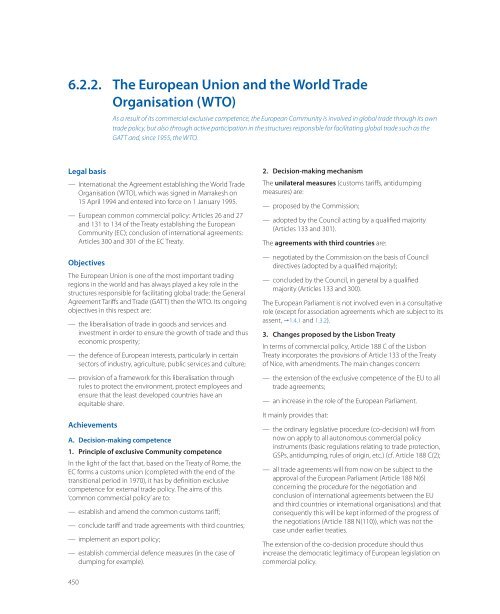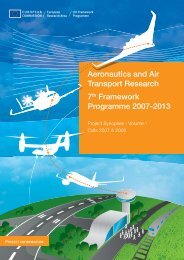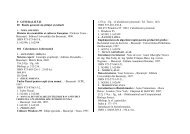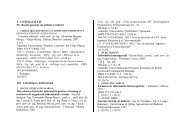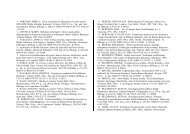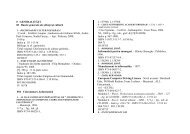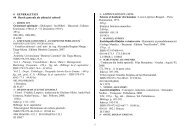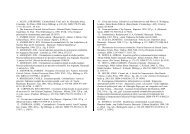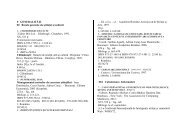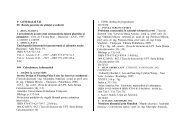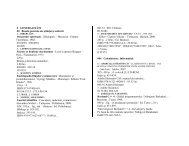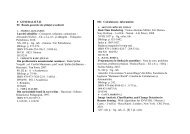Fact Sheets on the European Union â 2 - EU Bookshop - Europa
Fact Sheets on the European Union â 2 - EU Bookshop - Europa
Fact Sheets on the European Union â 2 - EU Bookshop - Europa
You also want an ePaper? Increase the reach of your titles
YUMPU automatically turns print PDFs into web optimized ePapers that Google loves.
6.2.2. The <strong>European</strong> Uni<strong>on</strong> and <strong>the</strong> World Trade<br />
Organisati<strong>on</strong> (WTO)<br />
As a result of its commercial exclusive competence, <strong>the</strong> <strong>European</strong> Community is involved in global trade through its own<br />
trade policy, but also through active participati<strong>on</strong> in <strong>the</strong> structures resp<strong>on</strong>sible for facilitating global trade such as <strong>the</strong><br />
GATT and, since 1955, <strong>the</strong> WTO.<br />
Legal basis<br />
— Internati<strong>on</strong>al: <strong>the</strong> Agreement establishing <strong>the</strong> World Trade<br />
Organisati<strong>on</strong> (WTO), which was signed in Marrakesh <strong>on</strong><br />
15 April 1994 and entered into force <strong>on</strong> 1 January 1995.<br />
— <strong>European</strong> comm<strong>on</strong> commercial policy: Articles 26 and 27<br />
and 131 to 134 of <strong>the</strong> Treaty establishing <strong>the</strong> <strong>European</strong><br />
Community (EC); c<strong>on</strong>clusi<strong>on</strong> of internati<strong>on</strong>al agreements:<br />
Articles 300 and 301 of <strong>the</strong> EC Treaty.<br />
Objectives<br />
The <strong>European</strong> Uni<strong>on</strong> is <strong>on</strong>e of <strong>the</strong> most important trading<br />
regi<strong>on</strong>s in <strong>the</strong> world and has always played a key role in <strong>the</strong><br />
structures resp<strong>on</strong>sible for facilitating global trade: <strong>the</strong> General<br />
Agreement Tariffs and Trade (GATT) <strong>the</strong>n <strong>the</strong> WTO. Its <strong>on</strong>going<br />
objectives in this respect are:<br />
— <strong>the</strong> liberalisati<strong>on</strong> of trade in goods and services and<br />
investment in order to ensure <strong>the</strong> growth of trade and thus<br />
ec<strong>on</strong>omic prosperity;<br />
— <strong>the</strong> defence of <strong>European</strong> interests, particularly in certain<br />
sectors of industry, agriculture, public services and culture;<br />
— provisi<strong>on</strong> of a framework for this liberalisati<strong>on</strong> through<br />
rules to protect <strong>the</strong> envir<strong>on</strong>ment, protect employees and<br />
ensure that <strong>the</strong> least developed countries have an<br />
equitable share.<br />
Achievements<br />
A. Decisi<strong>on</strong>-making competence<br />
1. Principle of exclusive Community competence<br />
In <strong>the</strong> light of <strong>the</strong> fact that, based <strong>on</strong> <strong>the</strong> Treaty of Rome, <strong>the</strong><br />
EC forms a customs uni<strong>on</strong> (completed with <strong>the</strong> end of <strong>the</strong><br />
transiti<strong>on</strong>al period in 1970), it has by definiti<strong>on</strong> exclusive<br />
competence for external trade policy. The aims of this<br />
‘comm<strong>on</strong> commercial policy’ are to:<br />
— establish and amend <strong>the</strong> comm<strong>on</strong> customs tariff;<br />
— c<strong>on</strong>clude tariff and trade agreements with third countries;<br />
— implement an export policy;<br />
— establish commercial defence measures (in <strong>the</strong> case of<br />
dumping for example).<br />
2. Decisi<strong>on</strong>-making mechanism<br />
The unilateral measures (customs tariffs, antidumping<br />
measures) are:<br />
— proposed by <strong>the</strong> Commissi<strong>on</strong>;<br />
— adopted by <strong>the</strong> Council acting by a qualified majority<br />
(Articles 133 and 301).<br />
The agreements with third countries are:<br />
— negotiated by <strong>the</strong> Commissi<strong>on</strong> <strong>on</strong> <strong>the</strong> basis of Council<br />
directives (adopted by a qualified majority);<br />
— c<strong>on</strong>cluded by <strong>the</strong> Council, in general by a qualified<br />
majority (Articles 133 and 300).<br />
The <strong>European</strong> Parliament is not involved even in a c<strong>on</strong>sultative<br />
role (except for associati<strong>on</strong> agreements which are subject to its<br />
assent, 1.4.1 and 1.3.2).<br />
3. Changes proposed by <strong>the</strong> Lisb<strong>on</strong> Treaty<br />
In terms of commercial policy, Article 188 C of <strong>the</strong> Lisb<strong>on</strong><br />
Treaty incorporates <strong>the</strong> provisi<strong>on</strong>s of Article 133 of <strong>the</strong> Treaty<br />
of Nice, with amendments. The main changes c<strong>on</strong>cern:<br />
— <strong>the</strong> extensi<strong>on</strong> of <strong>the</strong> exclusive competence of <strong>the</strong> <strong>EU</strong> to all<br />
trade agreements;<br />
— an increase in <strong>the</strong> role of <strong>the</strong> <strong>European</strong> Parliament.<br />
It mainly provides that:<br />
— <strong>the</strong> ordinary legislative procedure (co-decisi<strong>on</strong>) will from<br />
now <strong>on</strong> apply to all aut<strong>on</strong>omous commercial policy<br />
instruments (basic regulati<strong>on</strong>s relating to trade protecti<strong>on</strong>,<br />
GSPs, antidumping, rules of origin, etc.) (cf. Article 188 C(2);<br />
— all trade agreements will from now <strong>on</strong> be subject to <strong>the</strong><br />
approval of <strong>the</strong> <strong>European</strong> Parliament (Article 188 N(6)<br />
c<strong>on</strong>cerning <strong>the</strong> procedure for <strong>the</strong> negotiati<strong>on</strong> and<br />
c<strong>on</strong>clusi<strong>on</strong> of internati<strong>on</strong>al agreements between <strong>the</strong> <strong>EU</strong><br />
and third countries or internati<strong>on</strong>al organisati<strong>on</strong>s) and that<br />
c<strong>on</strong>sequently this will be kept informed of <strong>the</strong> progress of<br />
<strong>the</strong> negotiati<strong>on</strong>s (Article 188 N(110)), which was not <strong>the</strong><br />
case under earlier treaties.<br />
The extensi<strong>on</strong> of <strong>the</strong> co-decisi<strong>on</strong> procedure should thus<br />
increase <strong>the</strong> democratic legitimacy of <strong>European</strong> legislati<strong>on</strong> <strong>on</strong><br />
commercial policy.<br />
450


